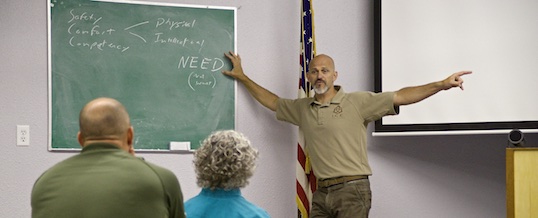
What if you disagree with your defensive shooting instructor?
You’re at a defensive shooting class; maybe this is your first, maybe it’s your twenty-first. Your instructor says (or does) something you disagree with. What do you do?
There are a lot of different approaches to teaching self-defense shooting, and while at least 90% of the mechanics that are taught are the same from instructor to instructor, the way in which they’re taught varies rather considerably. There is very little focus in this business on teaching in and of itself, most shooting instructors instead relying on what they’ve heard from other instructors who, like them, probably don’t have a teaching background either.
The net result is that sometimes an instructor passes along bad information or information in a bad way, which means his or her students aren’t getting the best education possible. So what do you do if you disagree with your instructor?
There are really two areas of concern: if your instructor asks you to do something unsafe, or your instructor tells/shows you something that conflicts with previous learning.
Safety
Safety in an instructional environment needs to be understood at a conceptual level, both by the instructor him/herself and the student. Briefly, the value of what your instructor asks you to do has to greatly exceed the risks you assume by doing it. That risk can be manages through proper safety procedures.
This idea has been likened to wearing hearing protection while shooting: we know that shooting guns damages hearing and that the damage is cumulative and irreversible. Shooting at a violent attacker inside your bedroom without any ear protection is definitely going to damage your hearing — but that risk is greatly outweighed by the benefit of you not being killed by the intruder!
On the other hand, if you’re taking your gun to a nearby indoor range for some informal target practice with friends, shooting without ear protection is foolish in the extreme: the recreational benefit of the activity doesn’t outweigh the damage to your ears. So you manage the risk of hearing damage by wearing earmuffs. Because those earmuffs reduce the noise level to a safe level, the risk of hearing loss has been reduced so close to zero that it is completely outweighed by the benefit you get from spending time with your friends.
We could say “never, ever shoot your gun without hearing protection because you risk losing your hearing”, but that would be silly; you don’t carry hearing protection with you every waking hour, and even if you did the chances of having enough time to use them in the face of a lethal attack is nil. Understanding hearing safety from the conceptual standpoint allows you to see the logic behind the rule, and it’s something your instructor needs to know as well. Sadly, too few do.
If your instructor asks you to do something that you perceive to be unsafe, first ask for clarification: maybe you missed a specific safety procedure that reduces the risk of the activity to an acceptable level, or maybe your instructor forgot to mention it in his/her briefing. Asking for clarification allows both of you to understand what’s going to happen and why.
If you’re still not satisfied that the drill or activity is safe, that the benefit outweighs the risks, you can decline to participate. I’ve done so a few times (and there have been other times that, in retrospect, I wish I had.) You don’t need to make a big show out of it, but politely inform your instructor that you don’t believe what you’re being asked to do is worth the safety risk you’re expected to take and that you’ll be content to simply observe.
If the safety risk is especially egregious, if even being an observer is unsafe, or if you run into multiple issues in the same class, you may elect to simply leave and politely demand a refund later. I’ve never done this but I’ve heard from others who have — and if what they relayed to me is factually correct I would have done the same thing in their place. There is, sadly, some very “sketchy” training being done out there and too many students are exposing themselves to danger without a corresponding benefit. You should never put up with that kind of activity!
Concepts
The other area of disagreement you might experience is when your instructor has you perform a technique or tells you something that conflicts with your prior training; this is actually far more common (thankfully!) than safety issues, and how you handle it will have a huge impact on what you get out of the class.
You must first let go of the notion that what you already know is absolutely incontrovertible, universal, and correct. It may be — but I’m assuming the reason you’re taking a class is to learn something new, right? If that’s the case, what you learn may conflict with what you’ve been doing; your task becomes reconciling the old information and the new, but you can’t do that if you don’t understand both!
In terms of technique, it’s not at all uncommon to encounter a student who insists on doing it “their” way because they’re comfortable and don’t want to change. It’s usually couched in other terms, of course; no one wants to admit that perhaps they aren’t open to better ways of doing things, or that what they’ve been doing for so long may not be optimal. The result is a resistance to even try to understand a different method.
(I can understand this to a certain degree. On occasion I’ve witnessed an instructor insisting on a specific method that wasn’t within the student’s physical capabilities, leading to frustration and poor performance. If the student has trouble with the technique as presented, it’s up to the instructor to modify that technique to fit and still achieve the goal. This doesn’t happen as much as it should; it requires a large amount of diagnostic ability on the part of the instructor, along with a willingness to admit to the student that it isn’t the perfect solution in their case. It’s that combination of ignorance and ego which can lead to problems.)
When you go into class do so with the acceptance that the only way to learn something new is to drop your resistance and really work at what you’re being taught. Yes, even if it’s different than what you’re used to. Once you’re done with class you can decide whether or not you’ll integrate that permanently into your repertoire. While you’re in class, though, have the intellectual honesty to really work at what’s being taught; give it a fair hearing before deciding that it’s not for you. The class is that fair hearing!
If you have actual physical discomfort with a specific physical technique ask your instructor to modify it to accommodate your specific needs — instead of giving up and defaulting to what you’ve always done. If he or she can’t or won’t do that, you’ve just learned something very valuable about your instructor!
What if the disagreement is over information or concepts? Here’s where it gets a little harder. It’s understandable to want to hold onto information that you’ve learned some time back, particularly if it’s from someone you admire or respect. When new information is presented which challenges the old very often people will simply not listen, sticking instead to their cherished viewpoints.
There’s nothing automatically wrong with old knowledge, as long as the old information is both correct and valid. If it isn’t, why would you want to hold onto it? The problem, of course, is figuring out which one is right!
First you need to understand what your context of use is. What that means is understanding the circumstances and conditions under which it would apply to you and your life. It’s entirely possible for information to be correct in one context (military use, for instance) but objectively incorrect in another, like private sector self defense. Understanding the real-world application of the information is critical to being able to determine whether any given piece of it is valid and therefore “correct”.
Once you understand the context of use then it’s up to you to ask questions. Well, actually, that’s only half of it — you need to ask questions and (politely, of course) demand answers!
If you find something with which you disagree, and you know what your plausible uses are, you can ask your instructor for his or her explanation of why they’re right and your previous learning is wrong. As I said, expect answers; not the rote or cliché-filled responses that people sometimes give when challenged, but answers that are logical, contextual, and supported by facts or observable data. Only when you have good answers can you resolve the disagreement between the new information you’ve been given and that which you’ve previously possessed.
Clarity is the goal
Always keep in mind that it’s not unusual for students to disagree with their instructors. Whether it’s about safety, technique, or information it’s your job as a student to gain clarity. If you’re lucky you’ll have a teacher instead of an instructor: one who understands not just the material but how to get his students to understand it at the highest levels possible (given class constraints, of course.) The clarity you need will be built into the lessons, and your disagreements will often be addressed before you can even voice them — through understandable information.
If you’re not quite as lucky, you’ll have an instructor from whom you can get the clarity you need after doing a little work: asking questions, demanding explanations that make sense. You can still get what you seek, you’ll just have to work a little harder.
If you’re tremendously unlucky, you’ll have a mere presenter who neither understands his material at a higher level than he’s presenting nor is able to give the kind of answers you seek. If you encounter one of these, your disagreements will stand without resolution; safety in particular becomes an issue at this level, and you must be vigilant about protecting yours.
Disagreement with your instructor? It happens; it’s common. How it’s handled by both of you will determine how well you learn. Be an active participant in your own learning!
– Grant Cunningham
- Posted by Grant Cunningham
- On November 2, 2015



